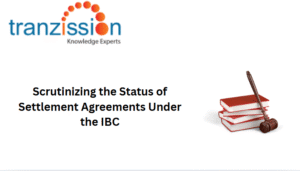
What are the consequences of non compliance with the IBC regulations?

Table of Contents
Insolvency laws in India have strict regulations regarding document submission, the responsibilities of insolvency professionals, actions of all stakeholders, legal requirements, and procedural necessities. Failing to non compliance with IBC regulations has several consequences, such as monetary penalties and possible imprisonment.
Understanding Section 186 of the Companies Act
Section 186 of the Companies Act, 2013 (hereon forward known as “the Companies Act”) regulates the granting of loans, guarantees, and investments by companies. It sets a specified limit without prior shareholder approval through a special resolution. This section essentially aims to prevent the misuse of company funds and protect shareholder interests by imposing restrictions on large-scale investments or financial obligations to other entities.
Read more : Offences and Penalties under IBC, 2016
Importance in Corporate Governance:
This section is crucial for corporate governance as it acts as a safeguard by restricting a company’s ability to extend loans, provide guarantees, or invest in securities beyond prescribed limits. Companies are required to disclose details of all loans, guarantees, and investments made in their financial statements. Hence, section 186 promotes transparency and safeguards against financial mismanagement.
Relevance to Insolvency Proceedings:
This section regulates the limits a company can extend for loans, guarantees, and investments, meaning if a company has violated these limits by providing excessive loans, guarantees, and investments, it can impact the financial health of the companies. It may trigger insolvency proceedings under the Insolvency and Bankruptcy Code, 2016 (IBC). Non-compliance can, thus, raise questions about the financial health of a company and its eligibility for insolvency resolution.
The IBC Framework
Role of Section 7 of IBC:
Section 7 allows financial creditors to initiate insolvency proceedings against defaulting companies by applying to the National Company Law Tribunal (NCLT). Non-compliance with laws can be a basis for initiating insolvency proceedings. Section 186 of the Companies Act acts as a safeguard against reckless lending by companies that could contribute to insolvency situations.
Regulatory Intent:
IBC provisions ensure accountability and prioritise creditors’ rights while deterring fraudulent financial practices. Section 45 allows the NCLT to set aside transactions that were undertaken with the intent to defraud creditors ensuring that assets are not depleted before insolvency proceedings begin. The NCLT shall make an order by restoring the petition as it existed before such transactions as if the transaction had not been entered into.
Consequences of non compliance with IBC regulations
Legal Implications:
Section 164(2) of the Companies Act deals with directors’ disqualification due to non-compliance with filing requirements or other regulatory breaches. This section outlines grounds for disqualifications, including failing to file financial statements or annual returns, not repaying deposits, or not paying dividends. Penalties include fines up to Rs. 5 lakhs and potential disqualification from acting as a director in any company for a specified period.
Read more : Balancing environmental claims during CIRP
Impacts on Insolvency Proceedings:
Non-compliance may lead to further legal and financial disputes. This may lead to delays in resolution due to legal challenges and reputational risks impacting the resolution process.
Impact on Creditors:
If creditors do not comply with the IBC provisions, rules, or regulations, they may face difficulties due to questionable financial decisions by the debtor.
Enhanced Scrutiny:
Failure to submit financial information, failure to adhere to the timelines under the IBC, and other actions that fail to comply with the insolvency regulations may increase scrutiny. Financial irregularities may lead to more stringent evaluations during insolvency.
Impact on Corporate Debtors:
Non-compliance erodes trust among stakeholders and potential investors. It can also accelerate insolvency proceedings, pushing the company toward liquidation as the resolution process fails.
Case Studies and Real-World Examples
In UKG Steels Pvt. Ltd. v. Erotic Buildcon Pvt. Ltd., the NCLT deemed a loan extended by a financial creditor to be unenforceable due to exceeding the prescribed limits under section 186 of the Companies Act, without proper shareholder approval, effectively dismissing the insolvency petition filed against the borrower company based on that loan. This decision highlighted how non-compliance with this section can render a debt “ultra vires”. Hence it is not legally enforceable in insolvency proceedings. Insolvency professionals may find it difficult to adhere to the specified timelines in the IBC, which leads to delays in circulating notices, determining fraudulent transactions, etc. They may face challenges from authorities and enforcement agencies, such as summons for commercial or, in more sensitive cases, criminal cases.
Preventive Measures for Companies
Companies are required to adhere to the contents of section 186 of the Companies Act and its limits. They must take the necessary approvals from the suitable authorities. Companies must maintain transparency and accountability if they do face insolvency proceedings under the IBC. Companies should also conduct regular accounting and auditing standards to detect any warning signs of insolvency. By establishing well-structured corporate governance, there will be minimum disruption during their business operations during insolvency. To ensure that a company will comply with insolvency regulations, it is recommended to take the help of experts to manage compliance and mitigate risks.
Conclusion: non compliance with IBC regulations
Non-compliance results in legal consequences and disrupts the insolvency process, delays resolution under the IBC, and potentially harms the interests of creditors and stakeholders. Non-compliance with Section 186 of the Companies Act can have significant consequences in insolvency proceedings under the IBC. Companies must prioritize compliance to avoid legal and financial setbacks. Therefore companies need to prioritise compliance to avoid legal and financial setbacks.
Frequently Asked Questions (FAQs)
What is Section 186 of the Companies Act?
Section 186 restricts a company from giving loans, guarantees, or acquiring securities beyond a prescribed limit without prior shareholder approval through a special resolution.
How does non-compliance impact insolvency under the IBC?
Non-compliance may lead to delaying the resolution process, a reduction in the value of the company’s assets, the company may be liquidated instead of restructured, and the company may face penalties and further legal action.
What are the penalties for non-compliance with Section 186?
As per section 186(13) of the Companies Act, if anyone contravenes this section, the company shall be punishable with a fine of Rs. 25,000-Rs 5 lakhs, and every officer of the company who is in default shall be punishable with imprisonment for a term which may extend to 2 years and with a fine of Rs. 25,000 – Rs. 1 lakh.





